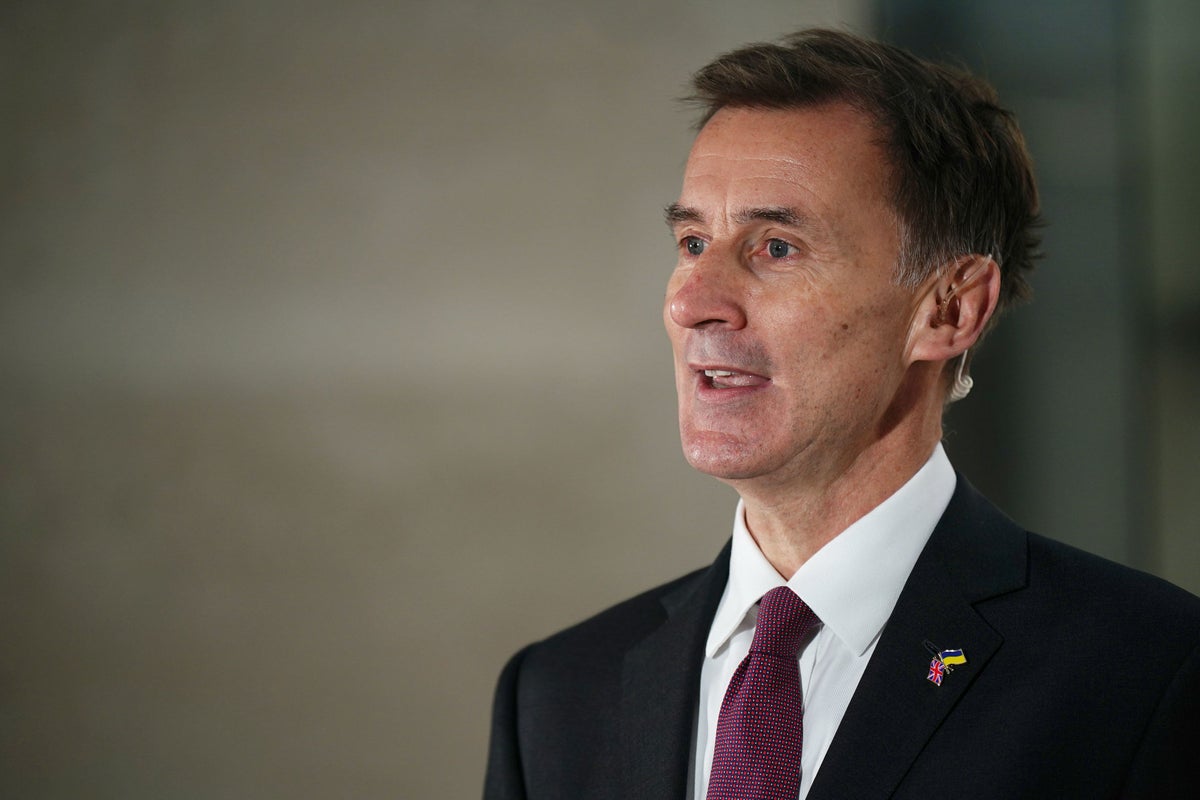For free real time breaking news alerts sent straight to your inbox sign up to our breaking news emails
Sign up to our free breaking news emails
Tax hikes or spending cuts would be needed for the Government to end public sector pay disputes and crippling strike action despite the UK being on course to borrow more than £30 billion less than forecast this year, according to a report.
The Institute for Fiscal Studies (IFS) think tank has warned that short-term savings from the energy support scheme looking less costly than first feared, together with an improved economic outlook, are not set to pave the way for the Government to hike public sector pay to match inflation.
But the IFS said Chancellor Jeremy Hunt may look to extend the current energy support scheme in the upcoming Budget, which would allow households to benefit from the current £2,500 cap for longer before it increases to £3,000 a year.
He could also dig deep into government pockets to help fund a one-off bonus for public sector workers in a bid to avert intensifying industrial action, according to the IFS.
It is difficult to see an end to public sector pay disputes and industrial action that does not involve the Treasury providing additional funding to departments
Isabel Stockton, IFS
Recommended
- Charity boss speaks out over ‘traumatic’ encounter with royal aide
- Ukraine war’s heaviest fight rages in east – follow live
The IFS pre-Budget report revealed that the Government is on track to borrow around £31 billion less than forecast by the Office for Budget Responsibility (OBR) in 2022-23 and some £25 billion in 2023-34.
This is largely as a result of an £11 billion saving as the energy support schemes are costing less, thanks to sharp falls in wholesale energy prices in recent months.
The latest Ofgem announcement on the energy price cap price – cut by almost £1,000 from the current £4,279 per year to £3,280 for the average household – will mean the cost of government energy support will plunge to just £1.4 billion in the 2023-24 financial year, according to the Resolution Foundation.
This is 90% less than the £12.8 billion forecast made at the Autumn Statement.
The Bank of England has also recently upgraded its outlook for the UK economy, predicting a shallower recession that initially feared, but with anaemic growth for following years.
But the IFS said the short-term borrowing boost would not allow for permanent spending increases, such as increasing public sector pay to match predicted inflation at 5.4% in the next financial year.
It argued that lower than forecast borrowing also does not strengthen the case more widely for permanent tax cuts or spending increases in the forthcoming Budget.
Isabel Stockton, senior research economist at the IFS, said: “It is difficult to see an end to public sector pay disputes and industrial action that does not involve the Treasury providing additional funding to departments.
One-off pay awards, or awards backdated to the start of 2023, would pose fewer fiscal challenges but would leave public sector staff permanently worse off
IFS
“Short-term improvements in the borrowing outlook could allow for one-off bonuses or backdated pay awards for public sector workers.
“But it is far from clear that these improvements will last and, if the Bank of England is right, the UK’s medium-term growth outlook may have deteriorated.
“Short-term savings cannot finance permanently higher spending – which is what a higher consolidated pay rise for public sector workers would entail.
“The Chancellor likely has less fiscal room for manoeuvre than recent headlines might suggest.’
The IFS said there may be wiggle room for the Government to dip into a £13 to £14 billion so-called unallocated spending reserve in the next two years to help resolve public sector pay disputes.
It estimates it would cost the Government around £5 billion to match pay to inflation and a further £9 billion to undo last year’s reduction in comparison with the private sector.
“One-off pay awards, or awards backdated to the start of 2023, would pose fewer fiscal challenges but would leave public sector staff permanently worse off,” the IFS said.
Recommended
- Rising number of children under 11 calling support line due to loneliness
- ‘I’ve still got it’ – F1 champion Jenson Button breaks reflex world record
- UK’s biggest listed companies hit gender balance target three years early
It also calculates that extending the current level of energy support for households and businesses for another three months would cost the Government around £2.7 billion.
IFS director Paul Johnson said the move would be a “very straightforward thing for them to do” and comes amid mounting calls for the Government to scrap plans to make support less generous for households and businesses from April.
✕
Subscribe to Independent Premium to bookmark this article
Want to bookmark your favourite articles and stories to read or reference later? Start your Independent Premium subscription today.
SubscribeAlready subscribed? Log in{{/url}}

